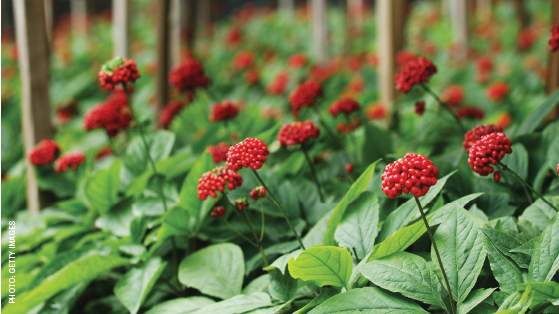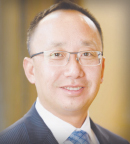The ASCO Post’s Integrative Oncology series is intended to facilitate the availability of evidence-based information on integrative and complementary therapies sometimes used by patients with cancer. In this installment, Eugenie Spiguel, MSN, ANP-BC, and Jyothirmai Gubili, MS, focus on American ginseng because of its popularity as a strength- and stamina-boosting herb.

Eugenie Spiguel, MSN, ANP-BC

Jyothirmai Gubili, MS
Overview
American ginseng is a perennial herb with a history of medicinal use by Native Americans to treat headaches, fever, indigestion, and infertility. Following its introduction to China more than three centuries ago, the herb continues to be used in herbal remedies for a variety of ailments. American ginseng is also promoted in supplemental forms to boost athletic performance, strength, and stamina, as well as to treat diabetes and cancer.
The Science
Pharmacologic studies found saponin glycosides, known as ginsenosides, to be the bioactive compounds in ginseng. In preclinical studies, these compounds demonstrated both stimulatory and inhibitory central nervous system effects,1 enhanced humoral and cellular-dependent immunity,2 and showed anticancer effects.3,4
Clinical data on this herb’s effects are limited. In a crossover study of 25 adults with type 2 diabetes mellitus on standard treatment, 1 g per meal (3 g/d) of American ginseng extract taken for 8 weeks yielded significant reductions in fasting blood glucose (−0.71 mmol/L; P = .008) and systolic blood pressure (−5.6 ± 2.7 mm Hg; P < .001) compared to the control group.5
In another trial, 323 participants with a history of at least two colds in the year prior to the study were randomly assigned to receive 400 mg of American ginseng or placebo daily for 4 months. Researchers reported reductions in the mean number of colds per participant in the ginseng group (0.68; standard deviation [SD] = 0.82) compared to those on placebo (0.93; SD = 0.91), for a difference of 0.25% (95% confidence interval [CI] = 0.04–0.45). In addition, there were fewer total days on which cold symptoms were reported (10.8 [SD = 9.7] vs 16.5 [SD = 13.8] days), for a difference of 1.6% (95% CI = 1.3–2.0).6

Scientific Name: Panax quinquefolius
Common Names: Xi yang shen, Tienchi ginseng, Western ginseng, five fingers
Preliminary findings suggest that American ginseng may have positive effects on working memory in young7 and middle-aged8 healthy adults, as well as in patients with schizophrenia.9
American ginseng may also have benefits in oncology settings. In a large population-based study of 1,455 patients with breast cancer, ginseng use was positively correlated with quality-of-life scores, and users had a significantly reduced risk of death. The adjusted hazard ratios associated with ginseng use were 0.71 (95% CI = 0.52–0.98) for total mortality, and 0.70 (95% CI = 0.53–0.93) for disease-specific mortality/recurrence.10
In a multisite study, 364 participants with diverse cancer types experiencing cancer-related fatigue were randomly assigned to receive 2,000 mg of American ginseng or placebo daily for 8 weeks. The primary outcome was measured by the Multidimensional Fatigue Symptom Inventory–Short Form (MFSI-SF). Compared to baseline, at 4 weeks, the MFSI-SF score was 14.4 (SD = 27.1) in the ginseng group vs 8.2 (SD = 24.8) in the placebo arm (P = .07).
OF NOTE
Physicians should be aware of the hypoglycemic effects of American ginseng and its potential for interaction with certain prescription drugs.Furthermore, the change in score at 8 weeks was 20 (SD = 27) for the ginseng group vs 10.3 (SD = 26.1) for those on placebo, a statistically significant difference (P = .003). Interestingly, benefits were greater in patients receiving active cancer treatment compared to those who finished their treatments.11
However, in a smaller study involving 32 patients with head and neck cancer randomly assigned to 1,000 mg of American ginseng or placebo daily for 8 weeks, the mean of the differences in fatigue scores between baseline and 8 weeks did not reach statistical significance.12
Further research is needed to determine the clinical effects of ginseng.
Herb-Drug Interactions
Warfarin: American ginseng was shown to reduce warfarin’s effects in healthy patients.13
Cytochrome P450 (CYP) 3A4 substrates: Some ginsenosides can induce CYP3A4 and may affect the intracellular levels of drugs metabolized by this enzyme.14,15 But the clinical significance of this interaction is not known.
Herb-Lab Interactions
American ginseng can reduce prothrombin time, partial thromboplastin time, international normalized ratio, and blood glucose levels.13,16
GUEST EDITOR

Jun J. Mao, MD, MSCE
Summary
American ginseng should not be confused with Panax ginseng or Siberian ginseng, which have different medicinal properties. American ginseng can be helpful in improving cancer-related fatigue, which is a common symptom and can be very distressing for patients. Fatigue is particularly prevalent in those undergoing treatment; therefore, care should be taken to avoid any herb-drug interactions.
Ms. Spiguel is a Nurse Practitioner and Ms. Gubili is an Editor, both at the Integrative Medicine Service, Memorial Sloan Kettering Cancer Center, New York.
DISCLOSURE: Ms. Spiguel and Ms. Gubili reported no conflicts of interest.
REFERENCES
1. Attele AS, Wu JA, Yuan CS: Ginseng pharmacology: Multiple constituents and multiple actions. Biochem Pharmacol 58:1685-1693, 1999.
2. Li B, Zhao J, Wang CZ, et al: Ginsenoside Rh2 induces apoptosis and paraptosis-like cell death in colorectal cancer cells through activation of p53. Cancer Lett 301:185-192, 2011.
3. Li XL, Wang CZ, Sun S, et al: American ginseng berry enhances chemopreventive effect of 5-FU on human colorectal cancer cells. Oncol Rep 22:943-952, 2009.
4. Wang CZ, Yu C, Wen XD, et al: American ginseng attenuates colitis associated colon carcinogenesis in mice: Impact on gut microbiota and metabolomics. Cancer Prev Res (Phila) 9:803-811, 2016.
5. Vuksan V, Xu ZZ, Jovanovski E, et al: Efficacy and safety of American ginseng (Panax quinquefolius L) extract on glycemic control and cardiovascular risk factors in individuals with type 2 diabetes: A double-blind, randomized, cross-over clinical trial. Eur J Nutr 58:1237-1245, 2019.
6. Predy GN, Goel V, Lovlin R, et al: Efficacy of an extract of North American ginseng containing poly-furanosyl-pyranosyl-saccharides for preventing upper respiratory tract infectons: A randomized controlled trial. CMAJ 173:1043-1048, 2005.
7. Scholey A, Ossoukhova A, Owen L, et al: Effects of American ginseng (Panax quinquefolius) on neurocognitive function: An acute, randomised, double-blind, placebo-controlled, crossover study. Psychopharmacology (Berl) 212:345-356, 2010.
8. Ossoukhova A, Owen L, Savage K, et al: Improved working memory performance following administration of a single dose of American ginseng (Panax quinquefolius L) to healthy middle-age adults. Hum Psychopharmacol 30:108-122, 2015.
9. Chen EY, Hui CL: HT1001, a proprietary North American ginseng extract, improves working memory in schizophrenia: A double-blind, placebo-controlled study. Phytother Res 26:1166-1172, 2012.
10. Cui Y, Shu XO, Gao YT, et al: Association of ginseng use with survival and quality of life among breast cancer patients. Am J Epidemiol 163:645-653, 2006.
11. Barton DL, Liu H, Dakhil SR, et al: Wisconsin ginseng (Panax quinquefolius) to improve cancer-related fatigue: A randomized, double-blind trial, N07C2. J Natl Cancer Inst 105:1230-1238, 2013.
12. Guglielmo M, Di Pede P, Alfieri S, et al: A randomized, double-blind, placebo controlled, phase II study to evaluate the efficacy of ginseng in reducing fatigue in patients treated for head and neck cancer. J Cancer Res Clin Oncol 146:2479-2487, 2020.
13. Yuan CS, Wei G, Dey L, et al: Brief communication: American ginseng reduces Warfarin’s effect in healthy patients. Ann Intern Med 141:23-27, 2004.
14. Hao M, Ba Q, Yin J, et al: Deglycosylated ginsenosides are more potent inducers of CYP1A1, CYP1A2 and CYP3A4 expression in HepG2 cells than glycosylated ginsenosides. Drug Metab Pharmacokinet 26:201-205, 2011.
15. Hao M, Zhao Y, Chen P, et al: Structure-activity relationship and substrate-dependent phenomena in effects of ginsenosides on activities of drug-metabolizing P450 enzymes. PLoS One 3(7):e2697, 2008.
16. Vuksan V, Sievenpiper JL, Wong J, et al: American ginseng improves glycemia in individuals with normal glucose tolerance: Effect of dose and time escalation. J Am Coll Nutr 6:738-744, 2000.

